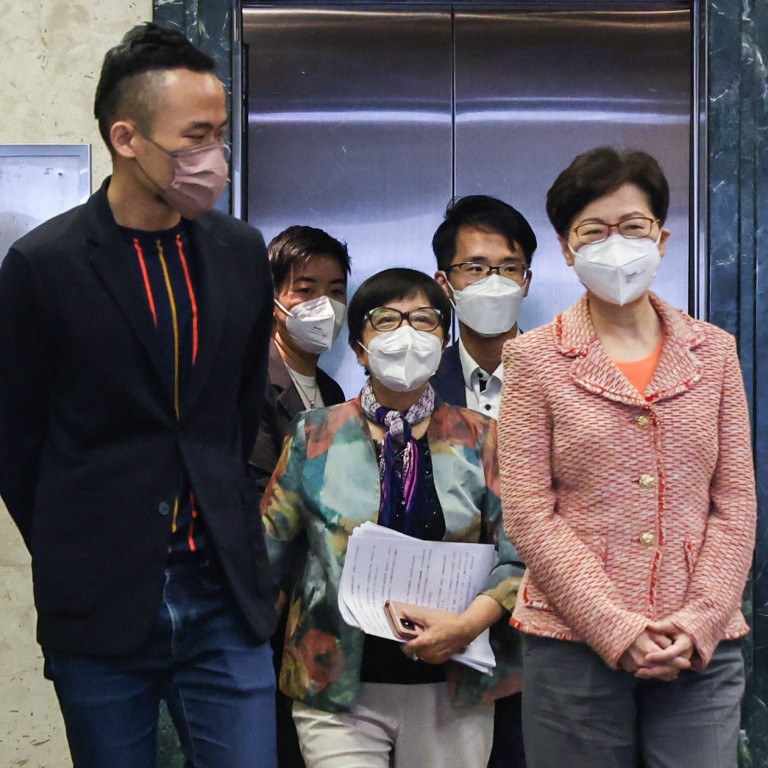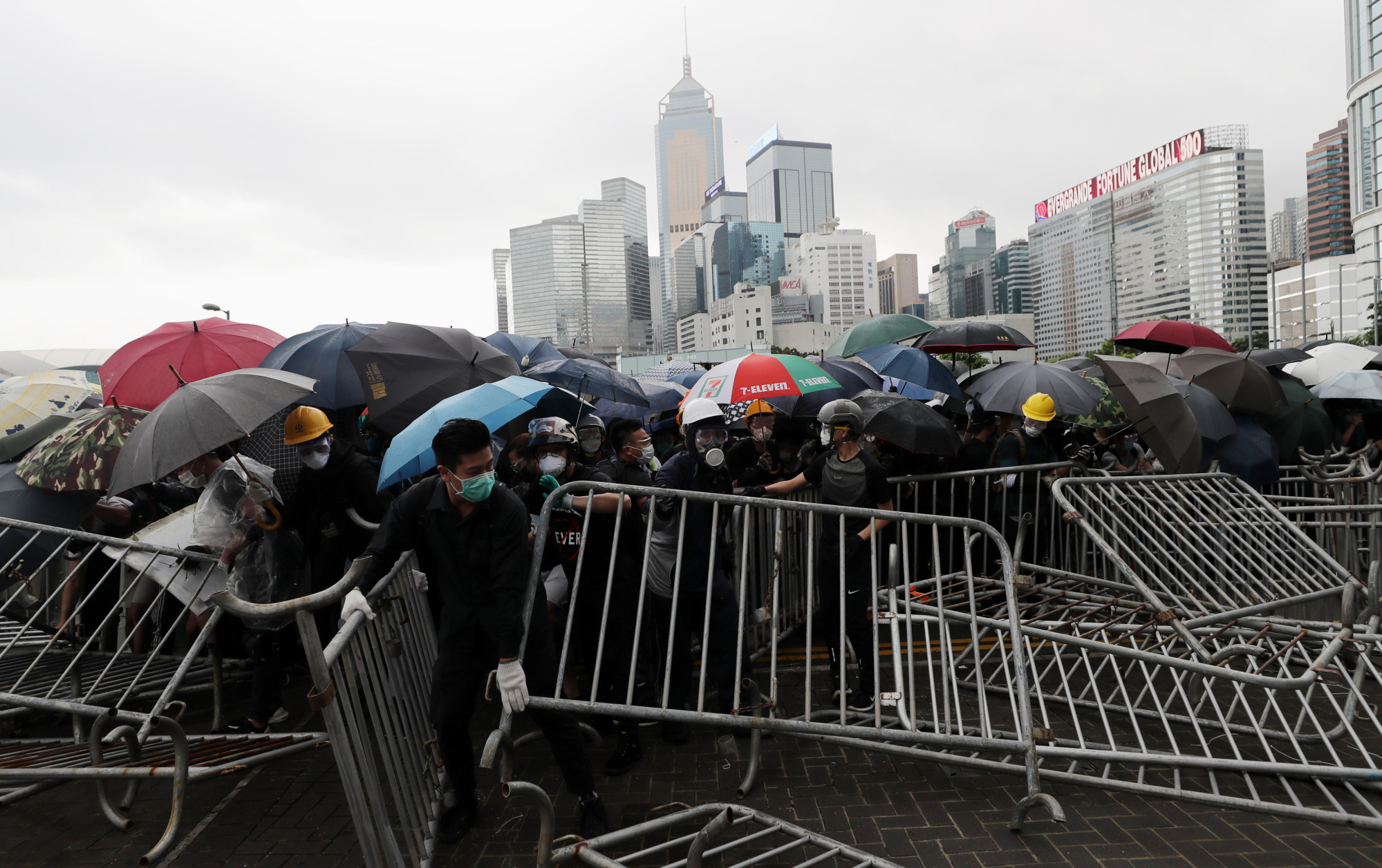
Hong Kong’s Carrie Lam urges next leadership to toughen up for ‘political struggles’ with foreign critics
- Appearing on a radio show, city leader Carrie Lam also reveals she previously told Chinese President Xi Jinping she was not knowledgeable about international relations
- Lam says next administration must not be afraid of ‘political struggles’ with foreign critics attempting to smear mainland China by using Hong Kong
Hong Kong’s outgoing leader has urged the next administration to be courageous and embrace “political struggles” against foreign critics, as she recalled conceding to Chinese President Xi Jinping five years ago that she was not knowledgeable about international relations.
Appearing on a radio show on Sunday, Chief Executive Carrie Lam Cheng Yuet-ngor also said she was relieved that after her term expired on June 30, whatever “happened in Hong Kong would have nothing to do with me”.
A day earlier, Lam had said she had no regrets about pushing for the extradition bill, which was eventually abandoned in the face of overwhelming public opposition, noting any resulting issues had stemmed from the “officials in charge of the bill” not making serious effort to explain it to residents.
Incoming leader and former security chief John Lee Ka-chiu and Secretary for Justice Teresa Cheng Yeuk-wah were the ministers responsible for handling the controversial bill at the time.
‘No regrets’ over extradition bill bid, Hong Kong’s Carrie Lam insists
On Sunday, Lam said Hong Kong remained a free city home to many foreign organisations, adding the next administration would need to have a strong sense of national identity and security.
“The most important thing is that the leading officials must not be afraid of ‘political struggles’. I’m not good at this and I don’t take pleasure in these struggles, but sometimes you have no choice,” she said.
“If others … use the city to smear our nation, Hong Kong officials must be bold in struggling against them.”
The outgoing leader also said Beijing’s implementation of the “one country, two systems” governing principle had never been “swayed or distorted” since Hong Kong returned to Chinese rule in 1997.
Central authorities, however, were forced to intervene in local affairs by imposing a national security law in 2020, she said, attributing the decision to “people with ulterior motives” stirring up political troubles, such as the 2019 social unrest.
Lam added that she had gained more experience in certain policy areas in recent years, revealing she had admitted to shortcomings regarding matters such as international politics and national security when she met Xi in 2017.
“I remembered that five years ago when I travelled to Beijing to accept my appointment, I told President [Xi] very frankly that I was trained in this government system and have rich administrative experience. But I lagged far behind in terms of political awareness, national security, as well as a broad perspective to see Hong Kong’s position and role in geopolitics,” she said.

Asked if she had delivered on her promise to heal Hong Kong’s sociopolitical divide, Lam would only say that central authorities in recent years had helped ensure one country, two systems was implemented correctly in the city.
“[The government and the people] needed to go in the same direction. If our thinking was too different, it’s meaningless to hold our hands and walk together,” she said.
“But now that one country, two systems is back on the right track with national security protected and the electoral system improved, this should be the best time, since the handover, for us to move forward.”
Lam also argued the revamped electoral reforms had ensured Hong Kong’s political system had moved closer towards the requirements laid down in 2014 under Beijing’s “831 framework”.
The framework states that if Hong Kong were to elect its leader by popular ballot, it must choose from two or three candidates put forward by a nominating committee.
However, a government proposal that strictly followed the framework was voted down by local lawmakers in 2015.
Lam said that even if the previous proposal had been passed, no candidate would have been returned uncontested. Hong Kong would still have needed to undergo further fundamental changes to ensure political stability and good governance, she added.
“I feel that, at that time, a lot of anti-Beijing sentiment was hidden in Hong Kong, and there were some foreign influences as well. So even if we had made it happen [in 2015], would another set of problems emerge?” she asked.
Citing efforts in 2020 by the opposition camp to secure most of the seats in the Legislative Council, Lam said a popular ballot for the chief executive would not have plugged several dangerous loopholes in the electoral system.
“[The opposition camp] could use other misleading ways so residents would also agree with them seizing political power, and turn the legislature into a base of subversion,” she said.
“That’s because we would only have achieved what’s on the surface – universal suffrage for the chief executive – and did not handle the problems underneath.”
As it happened: ‘No chance of border reopening soon’, Hong Kong's Lam says
But the outgoing leader said she was not worried about residents emigrating to Britain or other foreign countries, explaining that she believed many Hongkongers were patriotic, with lots of people expressing their national pride when Chinese athletes and astronauts visited the city or spoke with local students.
Lam added that she hoped the promotion of national identity could continue through the education sector and also the opening of the Hong Kong Palace Museum next month.
After delivering a report card during her last question and answer session at Legco on Thursday, the city leader told the radio programme on Sunday that she felt proud of her 42 years in public service.
“It’s hard for you to imagine how relieved to know that what happens in Hong Kong after July 1 has nothing to do with me,” she said.
Can John Lee learn from Carrie Lam’s mistakes and rebuild public trust?
Her remarks came as social media posts appeared on Telegram on Sunday urging Hongkongers in about 40 cities in countries such as Britain and the United States to gather to mark the third anniversary of clashes between police and protesters near Legco, which launched the 2019 social unrest.
Asked to comment on the impact of the demonstrations, Lam instead focused on what her administration achieved from July 2017 to mid-2019.
“Many people said my term is [marked] by unprecedented challenges as if it was miserable. But I’d describe it as characterised by big ups and downs, just like a roller-coaster ride,” she said.
“The government and I had two very fruitful and successful years … during which we opened several large-scale infrastructural facilities such as the Hong Kong-Zhuhai Macau-Bridge, and the Hong Kong section of the Guangzhou-Shenzhen-Hong Kong Express Rail Link.”

